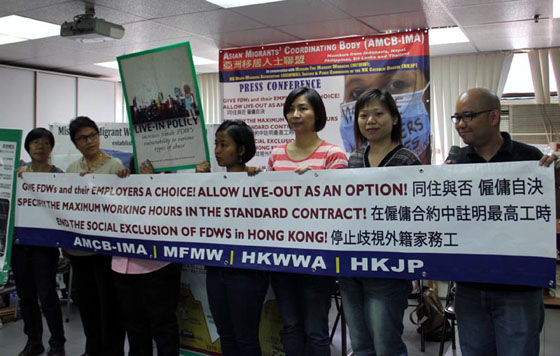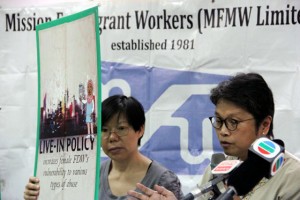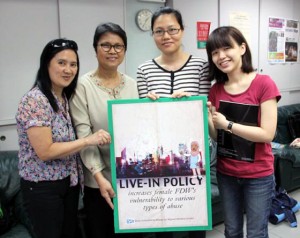
MANILA (Mindanao Examiner / May 1, 2013)- Foreign domestic workers are in a worse situation ten years after the mandatory live-in employment arrangement for FDWs was enforced, with their rights routinely violated and their working and living condition far from what should be accorded them as workers, according to the group called Mission for Migrant Workers.
Prodded by a significant number of female clients who were victims of abuse by employers, provided with unsuitable sleeping spaces and made to work long hours, the Mission with the support of the women’s group HerFund, conducted a study on the impacts of the mandatory live-in requirement to FDWs.
Through a survey of more than 3,000 FDWs across different nationalities on their accommodation situation, interviews with live-in FDWs on their experiences, and focus group discussions among migrant organizations, it can be concluded that the mandatory live-in requirement implemented in April 2003 not only has failed in its professed purpose of addressing moonlighting or “illegal work”, but has added on more problems to the work and life of FDWs.
Among the major findings of the study are:
1.Almost one-third of FDWs have no proper accommodation inside the household. They do not have their own room provided and have to either share the bedroom with other members of the household or sleep in common areas of the apartment such as the living room, study or playroom where there is very little privacy. Some even sleep in unsuitable spaces such as the bathroom, toilets, veranda, corridor, kitchen and storage rooms with only makeshift beds on top of ovens, cupboards or bathtubs. There are FDWs that are forced to share the room with young adult male members of the household.
2.Forty-six per cent of FDWs work for unreasonably long hours (37% for up to 16 hours and 9% for 19 hours a day). Because they are on-call for 24 hours, they have very little time for rest and sleep. An FDW interviewee relayed that she has been woken up in the middle of sleep during the most untimely hours to do even petty tasks as fetching a glass of water. FDW’s are also being required to work prior to and after taking their supposedly 24-hour rest day or holidays.
3.Live-in employment arrangement exposes FDWs to various types of abuses and also makes them insecure of their safety. The study showed that more than half of FDWs experience verbal abuse; and 18% of them experience physical abuse while 6% face various forms of sexual abuse from sexual innuendos or slurs, touching or fondling of body parts to rape in the residence of their employers. And 25% of FDWs are concerned with their safety in their sleeping place or quarter while 25% do not feel safe at all inside the household
4.Mandatory live-in arrangement did not address the Hong Kong government’s desire of preventing FDWs from taking on jobs outside their formal contract because employers themselves require them to take on work beyond their signed contract such as tasks in their employer’s business, at a relative’s household or taking care of the elderly and ailing parents.
The MFMW said it is concerned with the findings of this study and calls on Hong Kong government to not make mandatory the live-in employment arrangement but instead, leave the option to the mutual agreement of FDWs and employers.
It said stricter implementation of laws that protect both the local and foreign domestic workers, and the legislation of laws ensuring that the rights of both sectors are protected and upheld, must also be undertaken. These rights should respect the spirit and letter of the Convention 189 (Domestic Work is Decent Work) of the International Labour Organization.
“Ten years of the mandatory live-in arrangement are enough to know that it only makes worse the living and working condition of FDWs by putting their rights and safety at risk. Ten years are enough to say that the policy has to be reformed and live-in employment arrangement must just be made only with mutual agreement between and FDW and her employer,” it said in a statement sent to the regional newspaper Mindanao Examiner.



